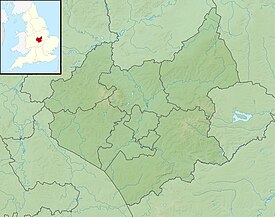Garendon Hall
| Garendon Hall | |
|---|---|

Garendon Hall c. 1890. Showing the 18th-century Classical style house, with the "rather horrible" 19th-century Gothic mansard roof.
|
|
| Location | Between Shepshed and Loughborough |
| Coordinates | 52°46′27″N 1°15′31″W / 52.7743°N 1.2585°WCoordinates: 52°46′27″N 1°15′31″W / 52.7743°N 1.2585°W |
| Area | Leicestershire, England |
| Built | 18th century |
| Built for | Ambrose Phillipps (unfinished at death) |
| Demolished | June 1964 |
Garendon Hall is a former country home, near Shepshed, Leicestershire, England.
The site of Garendon Hall was formerly occupied by a Cistercian abbey, known as Garendon Abbey. The abbey was founded in 1133 and dissolved by King Henry VIII in 1536.
Henry sold the abbey to Thomas Manners, 1st Earl of Rutland, for £2,356 5s 10d. The earl then constructed a house on the Abbey site, known as Garendon House. The house was owned by the Earls of Rutland until 1632, when it was given as part of a dowry for the marriage of Lady Katherine Manners (daughter of the 6th Earl of Rutland) and George Villiers, 1st Duke of Buckingham. In 1640 the estate was valued at £5,648 and was reported to contain 13,350 trees.
In 1684 the 2nd Duke of Buckingham sold the house to Sir Ambrose Phillipps (a successful lawyer) for £28,000. Sir Ambrose and his son William did little to the house; his grandson, another Ambrose Phillipps, an accomplished gentleman architect inspired by his Grand Tour of France and Italy, started to change the house and the former abbey estate. Beginning in 1734, Ambrose landscaped the surrounding parkland and built to his own designs, several Palladian follies, which still exist. Ambrose later began to redesign, extend and rebuild Garendon House in the Palladian style, developing it into what would be known as Garendon Hall. However, the work remained unfinished in 1737 when Ambrose died childless; it was completed by his brother Samuel, who inherited the estate (but who also died childless). In 1745 John Sanderson, a joiner and carpenter of London who was currently engaged in remodeling Okeover Hall to his own designs, was also working at Garendon Hall.
...
Wikipedia

